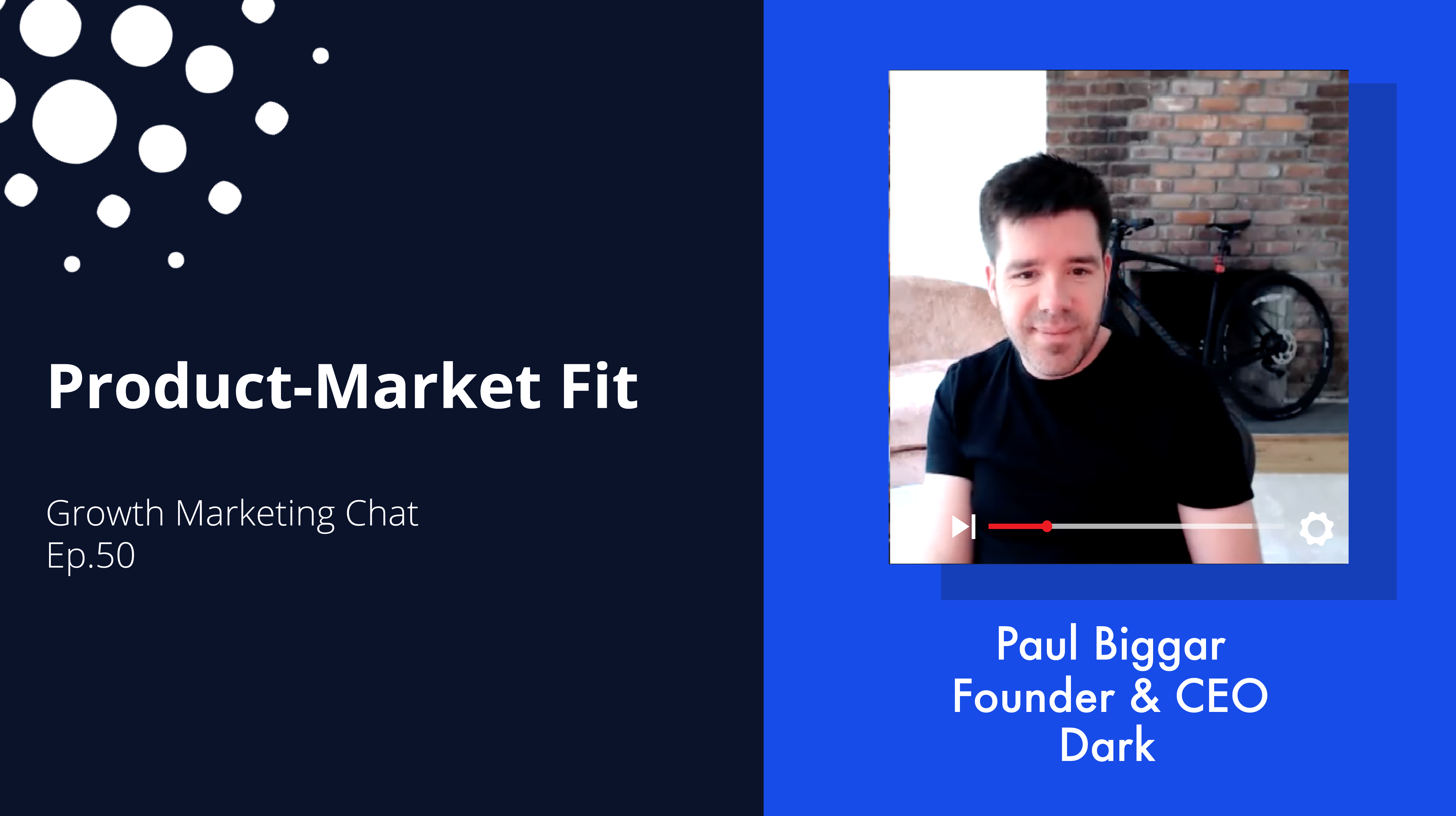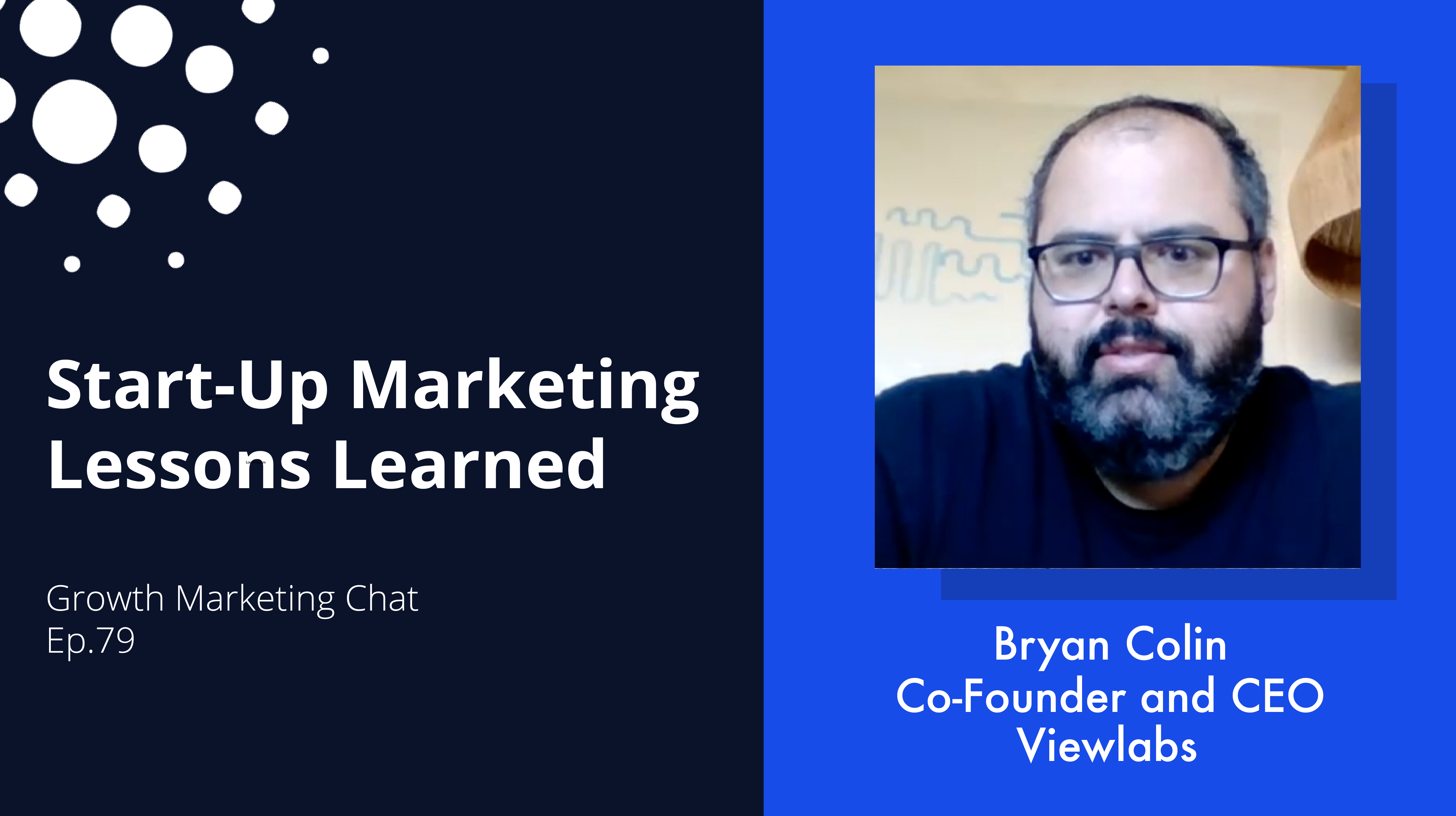The Ideal Start-Up Marketing First-Hire to Drive Growth
It might seem intimidating to be the first marketing leader at a new company. There isn’t a clear strategy or messaging in place yet, and creating those can seem like a Herculean task.
But really, the first marketing leader gets to start fresh without having to rework pre-existing ineffective strategies. It’s up to the first marketer at a start-up to shift things into gear and start building a unique and effective marketing strategy that will drive growth.
What a First-Hire Marketer Should Know
With the mindset that being hired as a start-up marketing leader is an exciting opportunity for growth, it’s time to find out the best way to get started.
In our latest Growth Marketing Chat episode, Pawan Murthy, Vice President of Marketing at Aumni, pulls from his rich marketing background to reveal the three things the first marketer at a start-up should do.
Tune in to learn about the importance of:
- Tightly aligning with sales to ensure a mutual understanding of messaging and bring in revenue faster.
- Having a clean and modern database, with the help of the right marketing automation strategies and automation agency. Investing money in ensuring you have the right database is extremely worthwhile!
- Building basic levels of content marketing that will remain firm and clear, especially in B2B sales.
Ready to build your marketing team and strategy from the ground up? Watch the full interview to learn how a start-up marketing leader can make the most impact.
Video Transcript:
CAROLINE: Hi. Today I am here with Pawan Murthy. Pawan is the head of marketing at Aumni. He also has a really rich background in marketing and strategy. He's been with a lot of series A and series Bs company, helping them get to that next milestone. So Pawan I'm really excited to have you on this podcast today. Thank you so much for being with us.
PAWAN: Thank you. Thanks for having me.
CAROLINE: So was your background, you've been the first marketer, at a number of companies. You also advise companies that were hiring their first marketers. So I'm really curious to hear your thoughts about what should the first marketer, first marketing hire, do when they start at a startup?
PAWAN: Sure. It's, it seems like a very daunting task to be the first marketer where there's nothing there. And there's a desire to do everything at once because there's so much that needs to be done. But in the years that I've been doing this, I think there's three basic things that the first marketing hire should focus on to build on to the next level, as the company grows. The first is really work with your sales team, or if it's an individual, that's its head of sales on sales enablement material that will force the company to start thinking about the messaging and also the audience. How you go and message to them, what you say and make sure that it's consistent.
So if it's sales decks, if it's one pagers, it's a 90 second explainer video. Start there because it'll help you go through the exercise of both segmentation, audience and messaging. While that's happening, because you'll be able to work with them. They'll hopefully start getting leads on their own and generating leads. You really need to start working on your database. If you don't have a very strong database, if it's, there are a lot of duplicates.
If the, the data is not clean, it hasn't been updated yet, or if it's just old, or it would be sure to use various services that are out there to either upend to refresh and it's worth to pay the money for it. And if we need to, you know, on the last ditch effort to buy lists and things like that, go ahead and do that, but then get it out very quickly. And then also with the database, find a very clean way of entering information and make sure its sales and marketing. Know exactly, how to enter the data and what they're entering in, in what format. The last part is just making sure you're starting to build out just the basic level of content marketing, especially in B2B sales.
If it's a B2B SAS company, you have to really work on educating your customer on your product. If it's something very revolutionary, you have to tell them what this product does and how it changes their life. And so just the basic levels of content marketing. So those, those three aspects are, I think, very critical when you start working on as the first time.
CAROLINE: Yeah. Yeah. And I love the order. You, the, order you use there, because as the first hire a lot of the time, you don't necessarily, unless you're really lucky as a marketer. You don't necessarily have really clear messaging arts yet and doing this will really enable your sales team to start bringing revenue faster, so this probably the highest impact you can have, you know, in the least amount of time with the least resources as a marketer.
PAWAN: Correct. And if you have the skillset of, you know, making some nice decks and making it look pretty, those are all the things that are helpful, but you also have to realize that, that the products most likely are going to be changing. They're going to be updated quite frequently with feedback from the customer. There could be major pivots in what you do in the company, as far as like the product. Even I've been in companies where we would focus on, we were, we were for sure that the, the buyer was the, the CFO of big finance company, the CFO office. And then within three months we realized, no, absolutely not.
It's actually the marketing people, the customer insights, people at large CPG companies. And so to be able to, if you had spent a lot of time building a big website and lots of material and everything, without focusing on the sales enablement and figuring out what the exact like buying cycle, and what's the path of least resistance, it would have been a complete waste of money and time. So sales enablement is important. Also part of the database kind of underlying that is the marketing tech stack. So if you have like, you know, very common Salesforce is used, but then also other things that we, we use a lot of these Calendly, we use a lot of Zapier. I've used Marketo. Started building those things, and as part of your tech stack is also goes hand in hand with the actual database.
CAROLINE: Yeah. Yeah. That's, that's really important. You need to, and you need to have clean data as you, as you mentioned right? And it's much easier to start building like the right database and the right tech stack when you have nothing, Right? Like, because when you enter a company that already has like hundreds of contacts. Wow, you know, that's a, that's a lot, I think this is actually an advantage for startup marketers. Nothing is there, so they can start clean. Right?
PAWAN: You are right. Yeah, and I've been in large companies where there would be millions of records and they would have to … Millions of records when the total accessible market for that particular industry was only a couple hundred thousand. So it was clearly duplicates. And so I've, I've worked in companies like that, where that was a huge issue to go through those legacy problems.
But even in a small company, even with just five people, you can still step on each other's toes, as far as entering in data entering and prospects. Common is, you know, do we enter it as a contact or as a lead in Salesforce? And if it's a contact, marketing automation has issues with the using things as a, you know, you can't go backwards and like, what are the stages within, with a particular sales cycle? And what does it, how is it important? These are the things that really need to be start discuss with sales and start really simple. So if it's just two or three sales stages and you work on leads, and then they convert the context.
Whatever, whatever the thing it is, as long as it's consistent, I've been in search situations where it's only just a handful of people, but the same person was in the same prospect was entered three times. And as they were trying to become a customer, we were sending out emails to this individual to become a customer or to get a demo. So it can, it can happen in the pace of a, of a startup that you'd still have, you know, this sort of like crossing of the responsibilities. So setting all that up from front is really, really important. Tech, technology is one thing, but the human aspect of it is something that's often looked over.
CAROLINE: Yeah. Yeah, definitely. And you need training for this, right? You need to really, as you said, sit down with the sales team and figure it out and then make sure that it's documented, and every new sales person is going to know, like, this is the process we're following here. Right?
All right, well, thank you so much. That was really insightful and really helpful. So really appreciate it.
PAWAN: Thank you.






